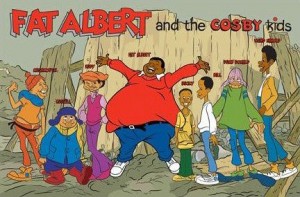“Hey, Hey, Hey!”
In Queens, New York 1992, Five African American men started a

Bill Cosby's "Fat Albert and the Gang" related to African American children and became honored and noted for its educational content
clothing line geared toward the African American community. Their brand was supposed to cater to all cultures and be in the price range of the lower class African Americans. They named their brand FUBU, which the majority believes is an acronym for the phrase “For Us By Us.”
Junior High, for me, was the year when young teenagers really began to focus more on their appearance in school. Everyone kept their jeans starched “extra crispy” where shorts could almost stand up on their own when you opened the pant legs. During this time, FUBU had become one of the hottest brands you would see walking down every hallway. Printed on some of their clothing were animations of Ali, the Globe Trotters, and “Fat Albert and the Gang,” an animated series directed by Comedian Bill Cosby. Ali and the Globe Trotters stood for African American figures that beat racial barriers, however “Fat Albert and the Gang” stood for much more than historical figures. Bill Cosby created the animation in order to relate to the African American children in society. Similarly to Black literature at the time, Fat Albert was known to be very educational as well as entertaining for its young viewers. Similarly to Black literature at the time, Fat Albert were one of the few programs on television that related to the black community. According to Laretta Henderson in her article Ebony Jr.!: The Rise and Demise of an African American Children’s Magazine, the “lack of literature for Black children was not a new concern for educators of African American children.”
Out of all the FUBU clothing I’ve seen up and down the halls of my Jr. High, almost every printed animation was Fat Albert and his gang. Reflecting back, I wonder if all of us embraced Bill Cosby’s animation because it appealed to our generation. The cartoon first aired in 1969 and was off the air before I was even born. Most of the people born in the mid to late 80’s, who wore FUBU, had never even seen the cartoon prior to the clothing line. This could serve as a prime example for African American children learning to read; images and story lines that relate to their character allows the literature to capture that child’s attention.
From Bill Cosby to FUBU to Ebony Jr., their products influenced the children of the “…black community by defining Blackness and by focusing on Black achievements that were ignored by schools and the White press.” Books like “The Brownies’,” helped “make ‘colored’ normalized” in society (L. Henderson pg649-60). After studying all the harmful effects of media in our society and educating myself on the viewpoints of the protestors, I’m still not a believer. Television, literature, and advertising has heavily impacted the youth in our black community by breaking down barriers in masses which may only be reached by the media.
